I watched the coronation of King Charles III last night with my 92-year-old mother. She is from the same generation as the late Queen Elizabeth II, both of them having lived through World War II in London. The air raids, the bombings, the not knowing if it was ever going to end. After days of rain, my mother still remembers waking up to clear skies on 6 June 1944 and to the drone of aircraft overhead.
My mother used to think the war would end with, ‘Hitler gassing us all in the bomb shelter at school.’ But as she remembers it:
The whole blue sky was covered in thousands of aircraft each one pulling a glider. Then came the broadcast on the wireless by Mr Churchill that the Allied troops had landed in Normanby. It was D-Day [Deliverance Day], and Europe was about to be liberated.
The D-Day landing had been postponed by two days because British Meteorologist James Stagg knew how to forecast the weather, enabling the Allies to take the Germans by surprise and stage the landing during a lull in the stormy weather. Otherwise, it may never have happened, or it could have been a failure, a casualty of bad weather. My mother could have been right after all, and the war may indeed have ended quite differently.
Meteorologist James Stagg understood the key variables affecting the weather (including lunar cycles) and he relied on a network of weather stations (mostly at post offices, including at Blacksod Point in the far west of Ireland) to provide information on temperatures and barometric pressure in order to provide accurate weather forecasting.
While the late Queen will always be remembered for never leaving London, even during the ‘Blitz’ – from the German term Blitzkrieg, this was the sustained campaign of aerial bombing attacks on British towns and cities from September 1940 to May 1941 – and being a part of the war effort more generally, the back story that King Charles has fostered is quite different. The new King’s story is all about him being one of the first to realise what he still believes is the real threat posed by human-caused climate change.
I read former Prince Harry, the Duke of Sussex’s memoire Spare when it first came out, and at the same time The King by Christopher Andersen. In both books it becomes evident that despite tragedy after tragedy befalling his immediate family, and Harry perhaps needing some of his father’s time, if not access to therapy, Charles distracts himself by attempting to save the world from climate change.
When Camilla was ‘utterly devastated’ following the death of her brother in New York City, Charles apparently ‘continued to sound the alarm about global warming’. While on the one hand crediting his grandchildren for bringing the issue into sharper focus, Prince Charles missed his first grandson’s birthday instead opting to be part of a ‘saving squirrels from climate change’ campaign in Scotland.
Harry is not critical of any of this in his book, rather appearing in awe of his father’s ability to spend evening after evening reading IPCC white papers on climate change. Camilla, and William, with perhaps less of the warrior spirit so evident in Harry, are less enamoured with King Charles’s obsessions with environmental campaigning if you read between the lines in Christopher Andersen’s book.
So, it is perhaps in deference to the new King’s long-standing penchant for all things catastrophic climate-change, including a stoush with a denier, that the British tabloid newspaper The Guardian has included something on this topic among all the Coronation stories today. Of course, their climate-change article is big on politics while being misleading when it comes to the actual science.
It paints me as the leading protagonist and villain. While never articulating the essence of ‘the campaign’, the article is titled ‘Climate scientists first laughed at a bizarre campaign against the BoM – then came the harassment.’
The title reminded me of the famous quote from Mahatma Gandhi: ‘First they ignore you, then they laugh at you, then they fight you, then you win.’
Apparently, Gandhi was borrowing from Nicholas Klein, a trade union activist who in a 1918 speech, said: ‘First, they ignore you. Then they ridicule you. And then they attack you and want to burn you. And then they build monuments to you.’
John Abbot is identified as my ‘side-kick’ – ‘her IPA colleague’. Certainly, the work that Abbot and I have pioneered over the last ten years should be of immense public interest as it shows a revolutionary and better way to forecast weather and climate. Further, for a period from 2012 until 2017, we had a series of key papers published in the mainstream international climate science journals.
It is disappointing that while peer review is repeated by the Bureau of Meteorology as being a prerequisite for open discussion (and bearing in mind that our peer-reviewed articles have, in fact, been published in reputable climate science journals) and after Professor Rita Karnawati, the head of the Indonesian Bureau of Meteorology, nominated me to head a 25-strong delegation from Jakarta via Brisbane to Melbourne to discuss, among other things, the advantages of using statistical models driven by Artificial Intelligence (AI) as a replacement to General Circulation Modelling for better medium term climate forecasting, the Bureau refused me entry to their headquarters.
These are the circumstances: the 25 Indonesian meteorologists were welcome inside the headquarters, but not me as the Australian leading the group. Before I boarded the plane in Brisbane, the project’s co-ordinator was told that if I landed in Melbourne and proceeded to the Bureau, it would result in a diplomatic incident. So much for The Guardian’s claim that it was me who harassed the Bureau.
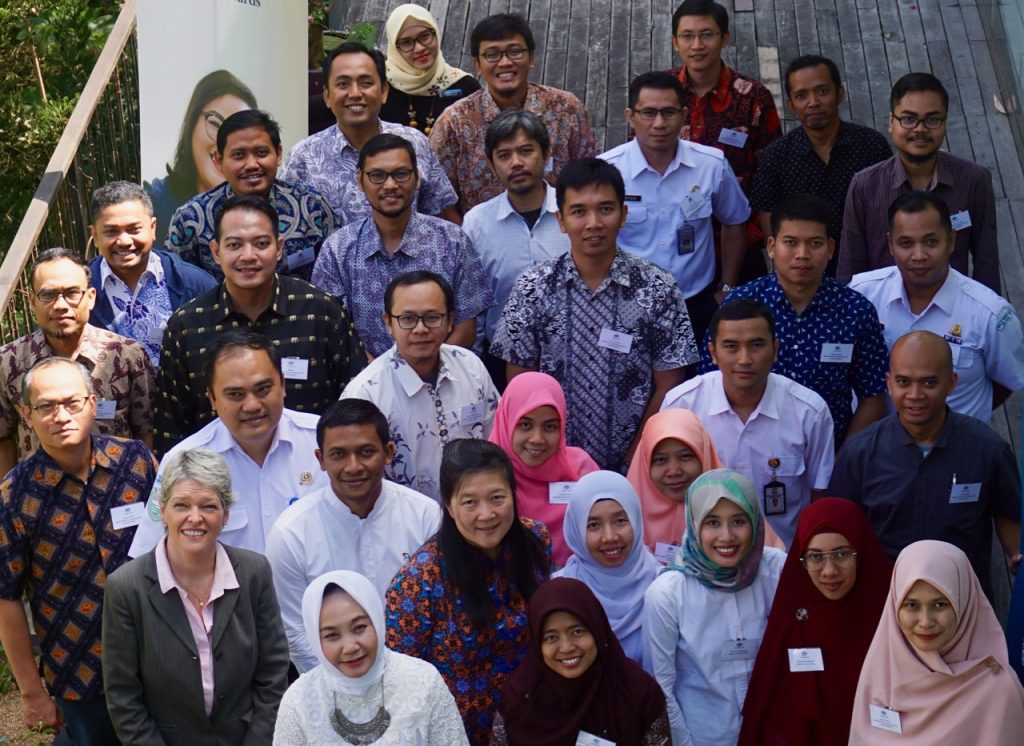
The Bureau followed this up by ensuring that the contract we had with the Queensland University of Technology through my company ClimateLab Pty Ltd was terminated. That contract was set up by a Stanford University MBA graduate who told me at our first meeting a year earlier that he was not concerned about the politics of climate change because he was a skilled negotiator. He said he’d even been successful in Kosovo where he had been part of a team sent by then US president Barack Obama to negotiate a peace deal.
But you see the Bureau don’t want peace, at least not if it means they must hand over the most basic of comparative temperature data.
In 1996, the bureau began transitioning from measuring temperatures using mercury thermometers to using platinum resistance probes connected to data loggers. At a small number of weather station some comparative data was recorded into meteorological field books, as hand written entries. It has never been made public. As I see it, they don’t want to transcribe the manually recorded measurements, lest they betray a high level of incompetence, if not malfeasance.
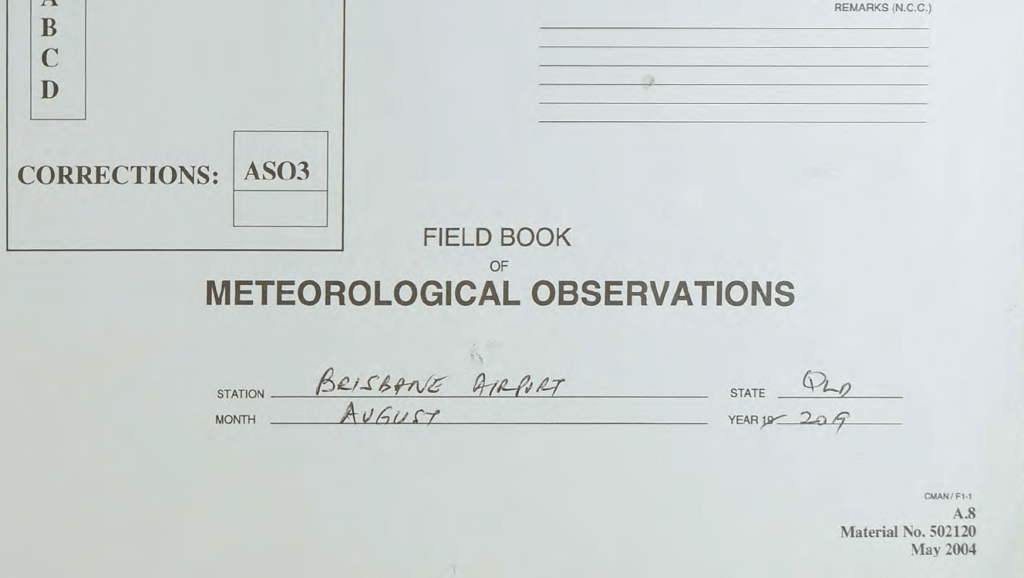
Access to that data would enable a critical assessment of whether the temperature measurements from different types of equipment are comparable enough for the construction of reliable continuous temperature records extending back to at least 1910.
This is the essence of my current ‘campaign against the Bureau’, as Graham Readfearn writing in today’s The Guardian characterises it, the article is here.
John Abbot and I want the 10 to 20 years of data for each of the 38 weather stations where the Bureau has been recording temperatures from both mercury thermometers and resistance probes at the same place and time to be made public. We are happy to transcribe the manual recordings from the A8 reports, which the bureau has variously argued is too onerous a task for its own staff.
It is my contention that the Bureau is only transcribing a tiny fraction of this data, and analysing a still smaller component, because proper scrutiny of its entirety will show that the resistance probes connected to the data loggers are producing readings that are not fit-for-purpose. Certainly, there is no equivalence between the readings from probes and mercury considering the limited amount of data that I have wrangled from the Bureau to date.
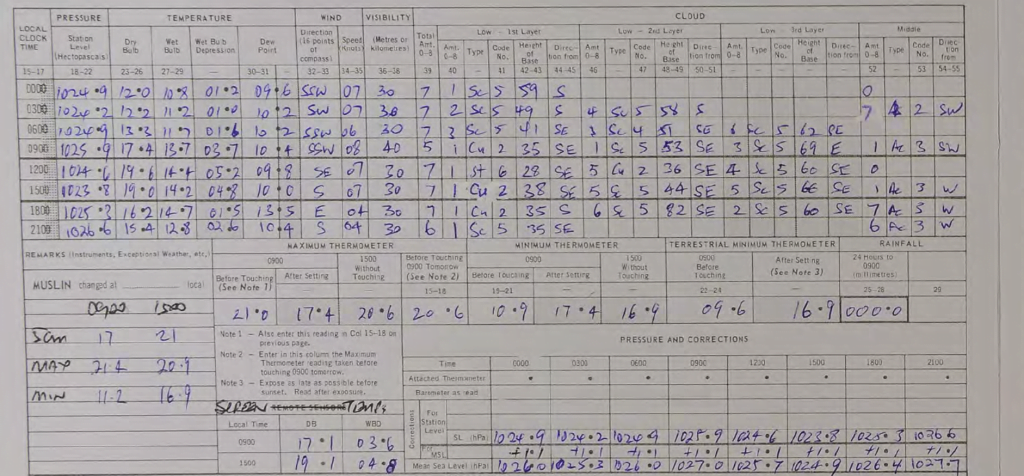
The Bureau claims, otherwise, specifically that the reading from the probe are within tolerance without defining what that means. All the time carefully avoid any mention of statistical significance – the usual measure of whether two means (the average temperature from the probe compared to the average temperature from mercury, for example) are equivalent, or not.
According to the article in today’s The Guardian, the Bureau claims that the mercury at Brisbane Airport was on average within 0.02 C of the automatic probe for a period of three years. And I get the same result across the three years. But this overall mean difference is small because there is an abrupt change/discontinuity in the direction of the difference after January 2020.
The readings before January 2020 show the mercury thermometer recording warmer, and the readings after January 2020 show that it is the probe that is recording warmer. This difference balances out mathematically; however, the discontinuity creates havoc if one is interested in climatology and the integrity of long continuous temperature measurements to feed into a statistical model underpinned by AI.
The overall difference (across the three years for Brisbane Airport) is statistically significantly different (n= 1094, p = 0.003, standard deviation = 0.18). The readings from the probe relative to the mercury are all over the shop: that is, they show significant scatter and it is not random.
The three years of parallel temperature data from Brisbane Airport shows that 41% of the time the probe is recording hotter than the mercury, and 26% of the time cooler. To reiterate, the difference is statistically significant (paired t Test, n = 1094, p < 0.05). The differences are not randomly distributed, and there is a distinct discontinuity after December 2019.
I initially thought that this step-change from an average monthly difference of −0.28 C in December 2019 to +0.11 in January 2020 (a difference of 0.39C) represented recalibration of the probe.
The bureau has denied this, explaining there was a fault in the automatic weather station that was immediately fixed and operating within specifications from January 2020 onwards. Yet even after January 2020, the probe was recording up to 0.7C warmer than the mercury thermometer at Brisbane Airport.
A 0.7C difference is enough to generate more record hot days for the same weather, supporting the narrative of the new King – that the planet risks overheating.
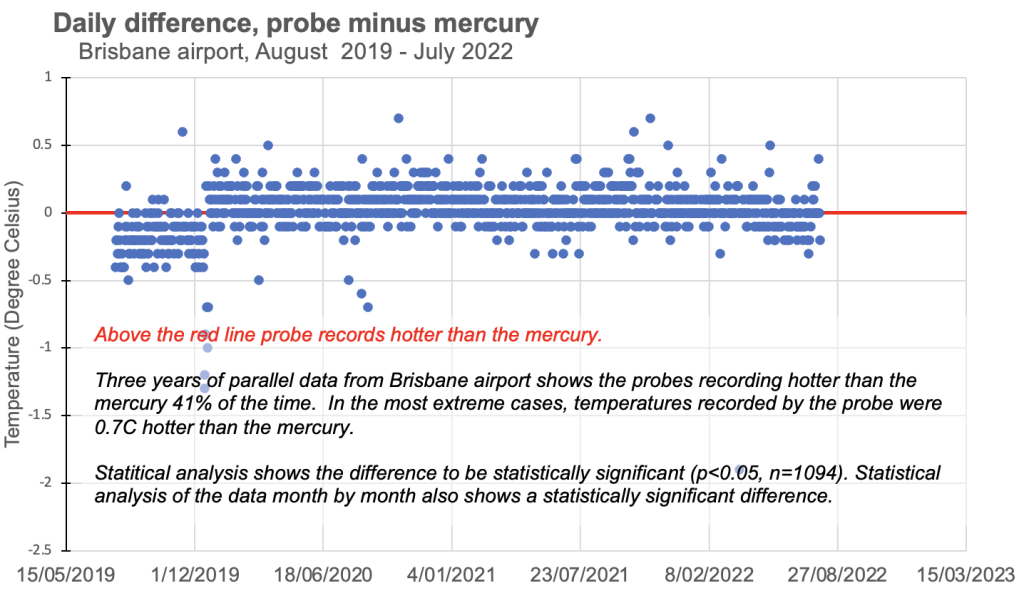
****
I will continue this saga in Part 3 soon. In it, I will explain how Anthony Rea, Readfearn’s spokesperson for the World Meteorological Organisation (WMO) passing judgement on the Bureau’s methods, was until recently an Australian Bureau of Meteorology employee.
Indeed, back in 2017, in order to manage a directive from the then Minister for the Environment Josh Frydenberg to provide me with the parallel measurements for Mildura, Rea was hastily moved into the newly created position of the Bureau’s Chief Data Officer.
You can read Part1 of this saga here, https://jennifermarohasy.com/2023/05/the-guardian-temperatures-misinformation-part-1/ that has been republished by Anthony Watts here, https://wattsupwiththat.com/2023/05/05/the-guardian-temperatures-misinformation-part-1/


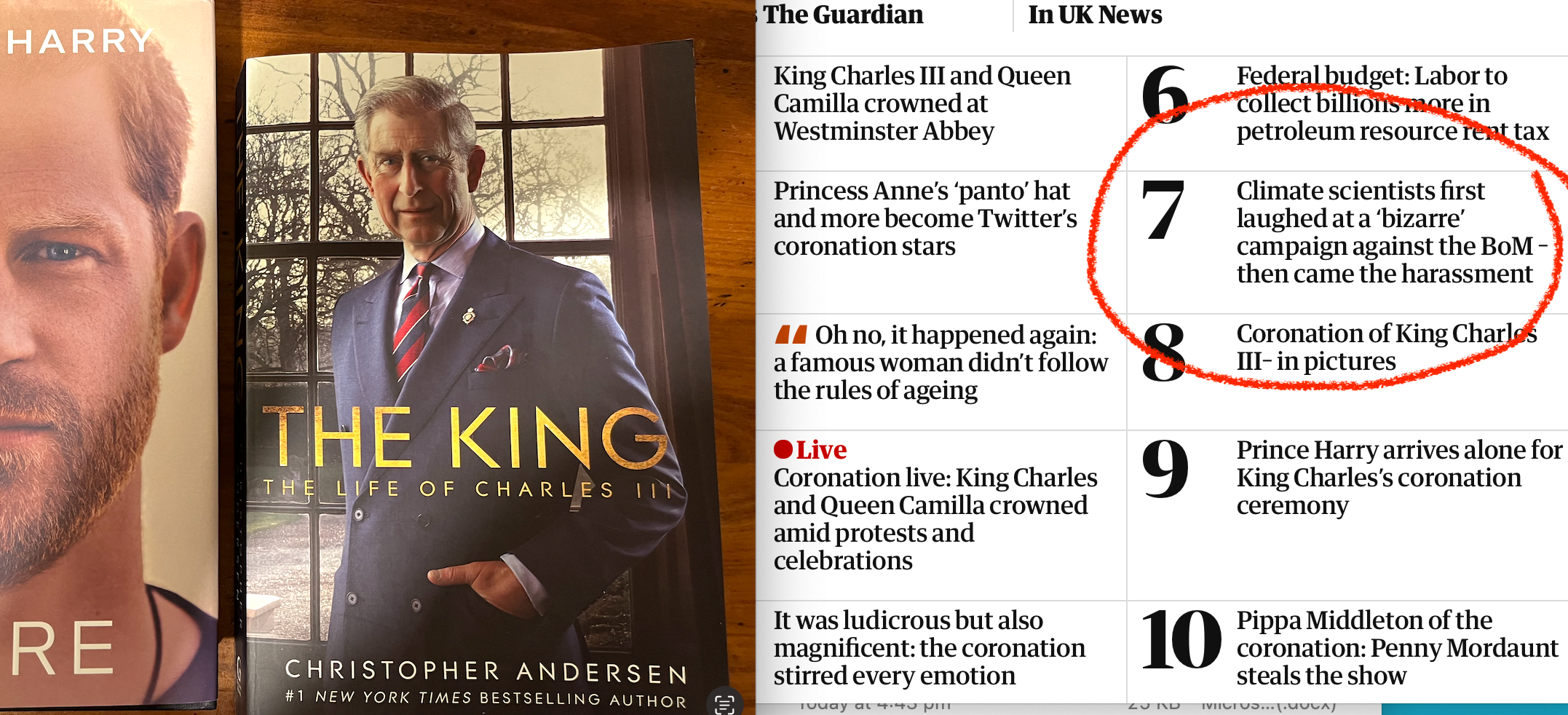
 Jennifer Marohasy BSc PhD is a critical thinker with expertise in the scientific method.
Jennifer Marohasy BSc PhD is a critical thinker with expertise in the scientific method.

BOM – Bureau of Mismanagement !
Jennifer, what you reveal about the BoM is shocking and really leads to a conclusion that they are not confident about their data or interpretations. Any reputable scientific institution would welcome assessment of its methodology and data as they would hope or expect to be shown to operate at the highest standards possible. Unfortunately, they are looking both unscientific and devious.
@ Bill:
Mismanagement or Malfeasance / Malice?
Keep up the good work Jennifer. I was wondering if a Chi-Squared analysis of the parallel sets of data might be useful.
Hi Jennifer,
what this all seems to show that the BOM is either incompetent or their is a hidden agenda from government to appease the green and left wokes and any business having $$$ invested in the so called Climate Change business
As usual from the political Left – that includes institutions like BoM they twist and misconstrue. Guardian hacks, like Redfearn are the white ants who eschew impartiality in order to get their agenda over the line. Anyway where is all of this climate change?
Earth still averaging around 14.2C
Great work Jennifer!
The Turnbull times aka the guardian are hopelessly compromised about climate change. They will never report in good faith. Never forget that Malcolm Turnbull and Greg Hunt ( both globalists and planet savers) scuttled Tony Abbott’s proposed review of the BOM.
The fact is that you and John Abbott have pulled the Bureau’s pants down! All they have left is name calling, obfuscation and misdirection.
Hi Jennifer,
I did make a comment on using Chi-Square analysis – which seems to have been deleted.
Keep up the good work.
Correction – No it hasn’t!
Sorry for not checking.
All the Best.
Thanks for sharing your evidence against a taxpayer funded failure that is being protected by ‘The Guardian’ rather than investigated. The sad and cruel truth is that the left wing media is harming the lives and prospects of possibly billions of people whose governments have been intimated by fear mongers.
Here’s hoping Prince Harry and Meghan get their heads around the sad and cruel truth. They may yet use it to save the UK monarchy for the next generation in line to the throne👑
Jennifer, was none of this actually reviewed by the BoM after all these calls from parliamentarians? Did nothing of substance get covered in these reviews?
It is incredible to me, that such a fundamental overlap of critical data can avoid scrutiny, for such consequential outcomes.
What is actually going on there do you think? Do they stand before the AAT and justify non disclosure on any grounds?
Keep up the excellent work Jennifer. Climate change is being used as a cover by incompetent bushfire management agencies, blaming massive bushfires on unprecedented weather conditions. Whatever climate variability we face in future must be informed by weather recording methods that are consistent across the decades.
Your FOI battles have parallels with an ongoing struggle I have with a leading Australian university. Attempts to get exchanges between a leading academic and two 9 Entertainment reporters, to get insights into whether there is a hand in glove working relationship to promote questionable science have just entered the third year.
The BOM is likely to be sued when their predictions, based on political rather than scientific grounds result in a major loss of life because their data is unreliable.